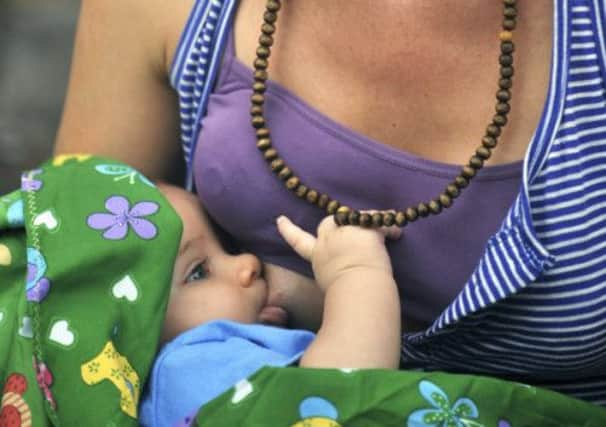Baby-friendly award boost for Scots mothers


The Unicef UK “Baby Friendly” hospital accreditation is given to hospitals where women receive high levels of care to help with nurturing and feeding their newborns.
The charity said 90 per cent of Scottish mothers now have their baby in a Unicef accredited hospital – compared to just 30 per cent in England, 58 per cent in Wales and 57 per cent in Northern Ireland.
Advertisement
Hide AdAdvertisement
Hide AdBut despite this support, the number of women who continue to breastfeed drops dramatically within a few weeks of leaving hospital, researchers found.
Unicef UK yesterday called for more effort to support women in their homes so babies continue to benefit from breastfeeding for as long as possible.
To receive the Baby Friendly accreditation, hospitals have to have staff who are trained to help women with breastfeeding as well as policies in place to encourage practices such as skin-to-skin contact in the early hours of a baby’s life.
The Unicef UK Baby Friendly Conference in Glasgow heard that the latest official figures showed the proportion of Scottish mothers who start to breastfeed has increased from around 50 per cent in 1990 to 74 per cent in 2010.
But by six to eight weeks after birth, only 36.5 per cent of mothers are still breastfeeding.
The Unicef figures revealed 20 out of 27 Scottish maternity hospitals were so far accredited by them for their breastfeeding work, with the rest working towards receiving the award.
Unicef UK Baby Friendly director Sue Ashmore said: “Having nine out of ten women giving birth in a Baby Friendly accredited hospital is an incredible achievement, and is very good news for all Scottish mums and babies.”
She added: “It shows what can be done when the will is there.
Advertisement
Hide AdAdvertisement
Hide Ad“This commitment needs to continue, as far too many mothers encounter difficulties once they get home and stop breastfeeding before they want to.”
Theresa McElhone, Baby Friendly lead officer for Scotland, said: “I have worked as a midwife for more than 40 years in Scotland, and I have seen a transformation from a total bottle-feeding culture in the 1970s, through to today, when nearly three-quarters of women start off breastfeeding.
“In some places, particularly in more deprived areas, breastfeeding is still seen as socially unacceptable, and these mothers and babies are the ones we really want to try to reach.
“So there is much more to be done, but it is worth stopping every now and then to applaud the excellent progress which has taken place so far.”
First Minister Alex Salmond praised the Baby Friendly initiative for working in partnership with health professionals to support women feeding their babies.
“To ensure that more of our hospitals achieve Baby Friendly status, the Scottish Government is providing additional financial support to boards and funding the four-year appointment of a Professional Officer for Scotland,” he said. “We want Scotland to be the best country in the world to grow up.
“This support helps to ensure that babies born in Scotland get the very best start in life, and live longer healthier lives.”
Pregnant women with diabetes ‘at higher risk of losing baby’
Advertisement
Hide AdAdvertisement
Hide AdWOMEN who have diabetes when they become pregnant have a much greater risk of their baby dying compared to other mothers-to-be, a study shows.
Research found that diabetes during pregnancy increased the risk of women losing their unborn foetus by around four-and-a-half times compared to pregnant women without diabetes.
Having pre-existing diabetes almost doubled the risk of death of infants after birth, according to the study in the journal Diabetologia.
The researchers from Newcastle University used information from medical registers to assess the link between diabetes and problems in offspring.
The researchers said, with the right care, most women with diabetes could have a healthy baby.
“Stillbirths and infant deaths are thankfully not common, but they could be even less common if all women with diabetes can be helped to achieve the best possible control of their blood glucose levels,” they said. “We already know that folic acid reduces the risk of certain congenital anomalies, such as spina bifida or cleft lip, which is why women with diabetes are advised to take high-dose supplements of five milligrams daily.
“These are available on prescription and should be taken for at least three months before conceiving. Our results suggest this simple action may also help to reduce the risk of stillbirth or infant death even in babies without these conditions.”